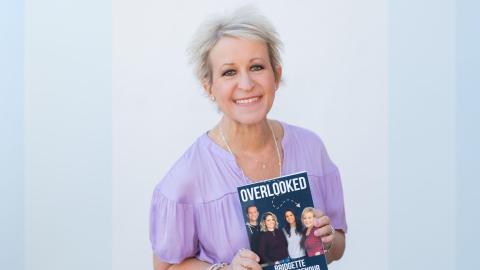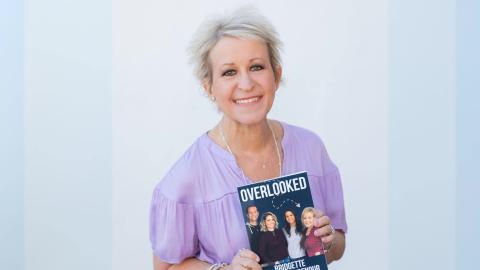It's Okay to Feel Your Emotions
REASONS WE ARE TANGLED UP
Jennie says, “I consider my fix-it nature a gift – a spiritual gift…but over the past few years, as I’ve been on a journey toward untangling my emotions, I’ve come to see things in a very different light…The truth is that I’ve been so busy fixing stuff that I’ve neglected the feeling part of me.”
Until a few years ago, she felt like her emotions were bad and would try to take over in situations bringing her pain and discomfort. As a result, she tried to deflect the pain instead of trying to understand what her emotions were trying to tell her. “Somewhere along the way, maybe from things I learned at church or just from growing up, I learned I wasn’t supposed to be sad or angry or scared. I was supposed to be okay. Or maybe it’s just because I hate the feeling of being out of control, and I believed these feelings were too scary, and sitting in the hard felt too hard.”
During the pandemic, Jennie recalls falling into an emotional pit. She felt exhausted from the demands of work, kids, and trying to survive the challenges of a pandemic. Although she was tired, she wasn’t mad, sad, or happy. In fact, she didn’t feel anything. She would sit in her chair in the mornings reading her Bible, but her heart felt distant and cold. She experienced an emotional numbness and longed to feel again. Jennie began to realize that she had ignored, minimized, and rejected her feelings.
UNTANGLE YOUR EMOTIONS
This past year, Jennie’s daughter Kate got married. The newlyweds began to talk about possibly moving outside the country for a few years. When they shared the news, Jennie’s airway constricted, and her chest tightened. Although she was happy for them, she didn’t understand why her heart and body couldn’t catch up. Her revved-up reaction was coming from something deep seated in her heart that had gone unaddressed.
She met with her counselor and began to realize that she had the same feelings when her husband, Zac, was in the hospital, and she was praying that God would spare his life. He had suffered a stroke and doctors were baffled as his blood pressure kept soaring. Jennie texted and asked everyone she knew to pray. Fear began to take hold of Jennie in the days that followed. She was afraid of losing him, and the life they knew, and being left alone. In her counseling session that day Jennie realized that every time Kate talked about moving away, subconsciously her brain and heart were being reminded of Zac’s hospital stay and the fear of being left alone. Things shifted for Jennie when she began to realize that “feelings were never meant to be fixed; feelings are meant to be felt.”
1. Getting past fine – noticing your feelings. Suppressing your emotions can have lasting consequences. One afternoon while driving home Jennie noticed she felt uneasy. Her breath was short and her chest felt tight. She did an assessment of her emotions and realized that while nothing had happened of significance that day Jennie was in a season of intense stress. Zac was spinning emotionally; finances were less certain and the demands of figuring out dinner for the night began to mount in her mind. Instead of having a meltdown she allowed herself to notice what she was feeling. When she got home, instead of having a breakdown, she and her family sat down and each talked about the stress of their days. They faced the hard emotions together. She says, “Emotions are best healed in community.”
2. The vocabulary of emotions – naming what you feel. Anxiety and depression are not feelings; they are something the doctor diagnoses. “Emotional wholeness begins by noticing and naming what we feel and then deciding what to do with it, allowing these emotions to draw us to God and one another,” shares Jennie.
3. Give yourself some space – feel your emotions. Jennie’s husband Zac struggles with depression. When Zac spiraled into his first emotional low in 2014, Jennie was in survival mode for herself and her family. Zac has emerged from those months of depression and is in a completely different place today. His business is doing well. She watched him live this book as she wrote it. Expressing his emotions regardless of the circumstances has allowed him to be lighter, more hopeful, and peaceful again.
4. You are not alone – share your feelings with your community. In a recent small group meeting Jennie talked about challenges she was facing at home. She shared how Zac’s business was struggling, how she was dealing with a pressure-cooker experience at her work, and one of their kids was veering off the rails and seemed destined for a crash. After talking she asked the ladies in the group what they “felt” about what she discussed. One told her, “I feel proud of you for telling us (about her struggles) and for walking through such a difficult season with Zac with grace. Their words of empathy and comfort made Jennie feel seen and comforted.
5. What to do with what you feel – choosing what is next. A relationship with God changes everything.
“He untangles the knots through seasons of tears and raw honesty and running again and again back to Him... because He cares for us. He wants all of us. He wants to know it all.” In 2018, Jennie was speaking at a conference in Texas. A collective confession unfolded before her eyes. After she spoke, she asked those in attendance to set down the burden they’d been carrying. Kids began standing up from their seats and shouting their hidden sins such as “pornography” “suicidal thoughts,” etc. Months later she spoke at Baylor University and the same thing happened. Then she spoke at the Passion conference in Atlanta to sixty-five thousand students and the same thing occurred. God isn’t afraid of our brokenness, and neither should we be. Be honest about your emotions and your desperate need for God.
EMBRACING THE HEALING
“Living life tangled up emotionally is not really living at all,” reveals Jennie. As you too grow in emotional health Jennie wants you to remember a few things:
• Your feelings do not have authority over you; rather you have authority over them because of Christ Jesus.
• When you begin to acknowledge how you truly feel and you share those feelings with others, remember that we are broken people living in a broken world.
• God longs for us to use our emotions to help us become better at living life.
• Some thoughts we can interrupt, and some feelings will not go away no matter what we do. God is with us through it all.
• When you learn how to feel your feelings and not run from them, you can free up all that energy you were pouring into not feeling and contribute something beautiful to the world. As you become more emotionally healthy you also increase your capacity to serve, give, and care.
JENNIE’S INFO.
Jennie is a Bible teacher, author, and the visionary behind IF: Gathering, a women’s ministry providing gospel-centered study resources, an annual conference, and opportunities for community. She is also the Founder & Visionary of Gather25, a 25-hour global prayer gathering. In 2022, she began to wrestle with the question, “What if Jesus came back in 10 years?” In an effort to reach the billions of people on earth who don’t know Jesus, Jennie began to assemble a team to be mobilized to share the Gospel. Throughout 2023, this group began to dream about what a gathering of the global Church - every man, woman, and child who follows Jesus - could look like, and Gather25 was born. Major partners began to step in visiting each continent to build relationships and explore possibilities. Then, in February of 2024, the first invitation went out to the 100,000+ women of IF: Gathering. The first of its kind event will take place on March 1, 2025, for in person and on-line attendees.
To purchase Jennie Allen's book, Untangle Your Emotions, and to discover more about her ministry, please visit her website: www.JennieAllen.com. More information about her global minoistry, IF:Gathering, can be found at www.IfGathering.com.



